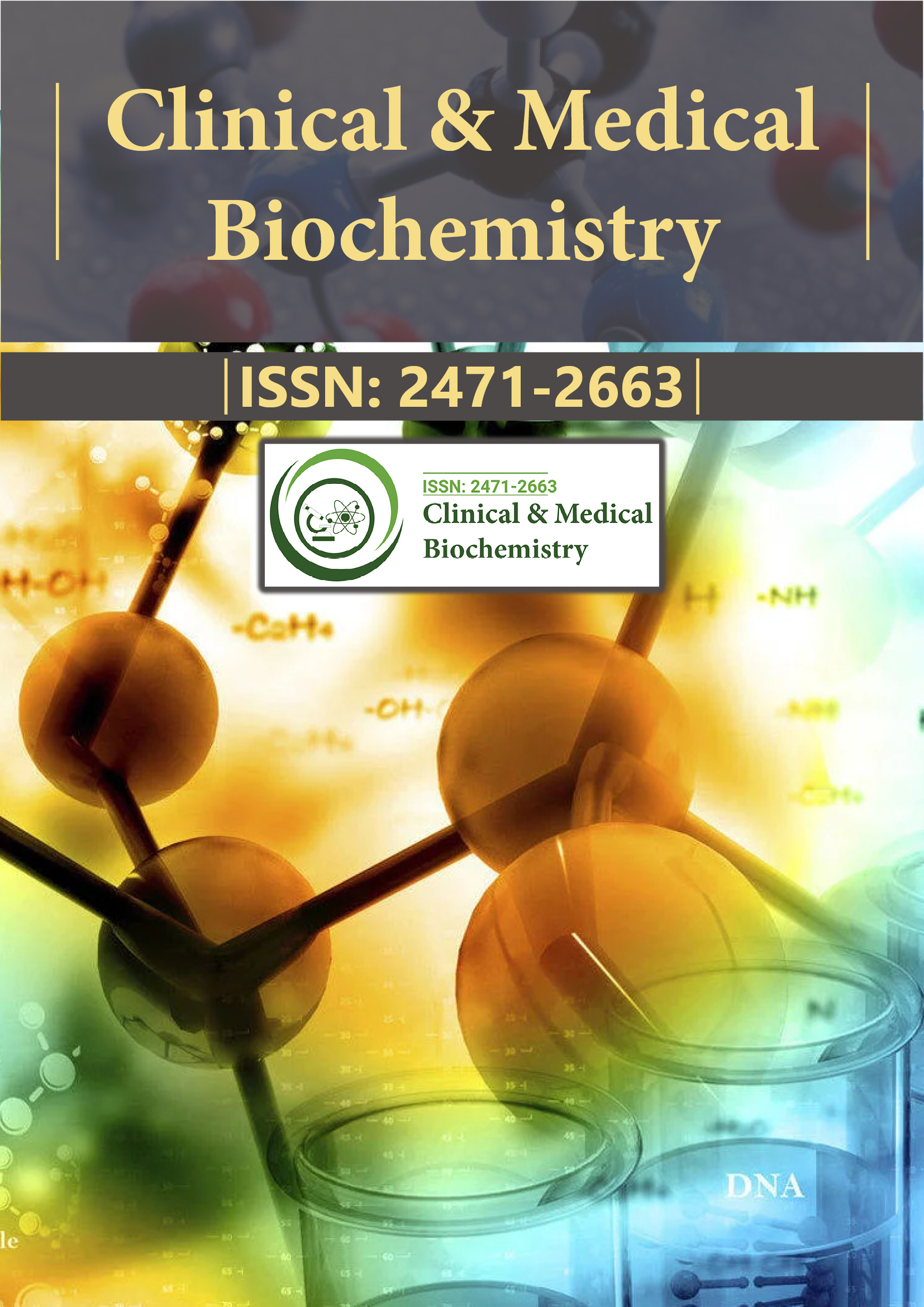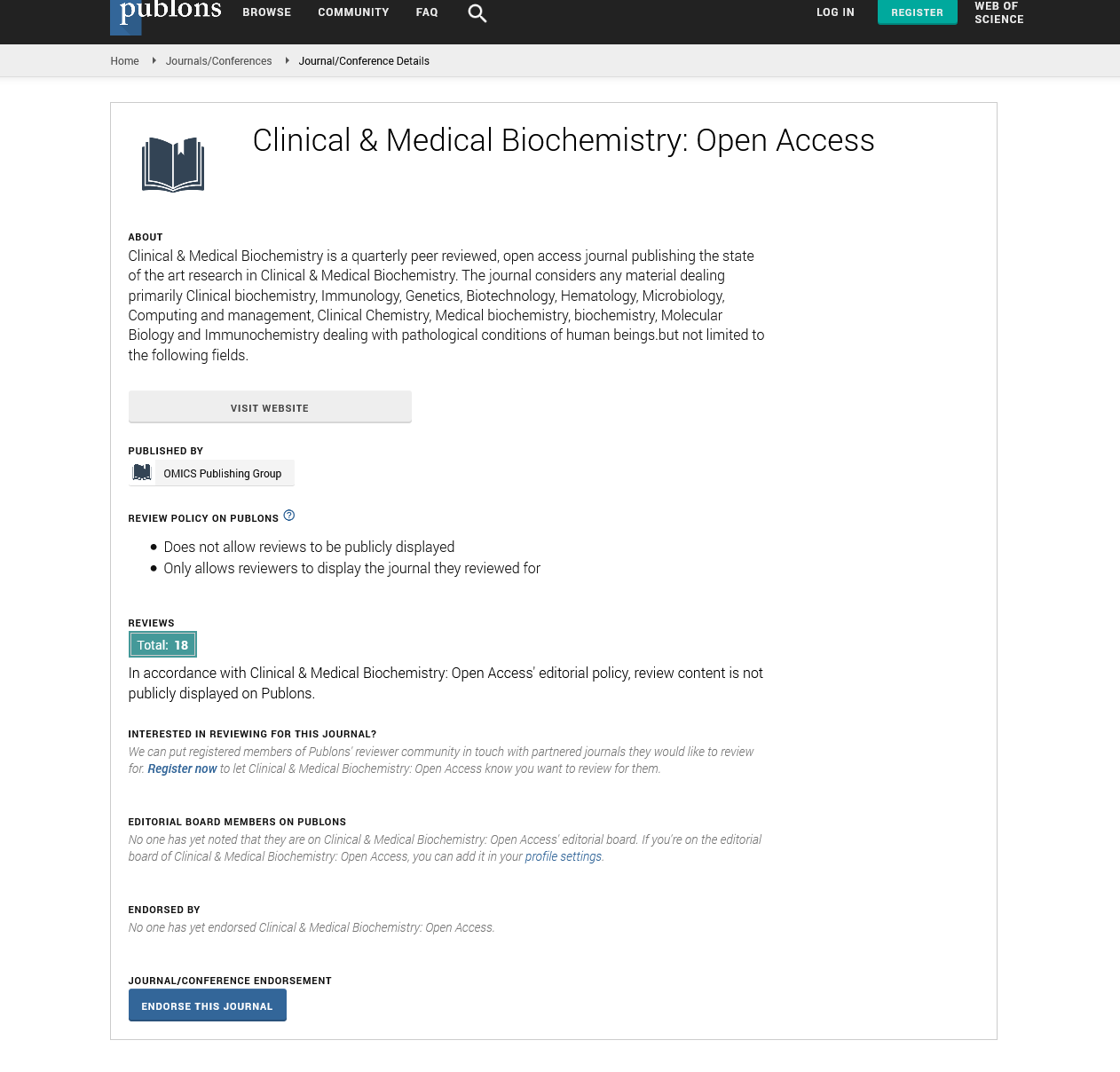Indexed In
- RefSeek
- Directory of Research Journal Indexing (DRJI)
- Hamdard University
- EBSCO A-Z
- OCLC- WorldCat
- Scholarsteer
- Publons
- Euro Pub
- Google Scholar
Useful Links
Share This Page
Journal Flyer

Open Access Journals
- Agri and Aquaculture
- Biochemistry
- Bioinformatics & Systems Biology
- Business & Management
- Chemistry
- Clinical Sciences
- Engineering
- Food & Nutrition
- General Science
- Genetics & Molecular Biology
- Immunology & Microbiology
- Medical Sciences
- Neuroscience & Psychology
- Nursing & Health Care
- Pharmaceutical Sciences
Perspective - (2025) Volume 11, Issue 1
Medical Biochemistry Tests: Essential Tools for Diagnosing and Monitoring Health Conditions
Thomas Christos*Received: 26-Feb-2025, Manuscript No. CMBO-25-29229; Editor assigned: 28-Feb-2025, Pre QC No. CMBO-25-29229; Reviewed: 14-Mar-2025, QC No. CMBO-25-29229; Revised: 21-Mar-2025, Manuscript No. CMBO-25-29229; Published: 28-Mar-2025, DOI: 10.35841/2471-2663.25.11.240
Description
Medical biochemistry tests are a fundamental component of modern healthcare and clinical diagnostics. These tests analyze the chemical constituents of blood and other bodily fluids to assess organ function, detect disease, monitor treatment and evaluate overall health status. Medical biochemistry bridges the gap between laboratory science and clinical medicine by providing measurable indicators of physiological and pathological processes. These tests are ordered routinely in hospitals, clinics and laboratories and form the basis of most health assessments.
Medical biochemistry tests involve a wide range of analyses that reflect various aspects of body function. These include tests for kidney function, liver enzymes, electrolytes, glucose metabolism, lipids, hormones, proteins, enzymes and markers of inflammation or tissue damage. Most of these tests are performed on blood serum or plasma obtained from venous blood samples, although urine and other fluids may also be tested depending on the clinical question. Each test provides specific information and when interpreted collectively, they can reveal complex underlying conditions even before symptoms become apparent.
Kidney function tests are among the most commonly requested biochemical assessments. Blood Urea Nitrogen (BUN) and serum creatinine levels are used to estimate how efficiently the kidneys are filtering waste products. Elevated levels of these waste compounds may indicate impaired renal function, dehydration, or increased protein breakdown. Alongside these, estimated Glomerular Filtration Rate (eGFR) is calculated to evaluate the severity of kidney impairment. These tests are essential in monitoring chronic kidney disease, evaluating drug toxicity and guiding fluid and electrolyte management.
Liver function tests measure enzymes and proteins produced or processed by the liver. Alanine Aminotransferase (ALT), Aspartate Aminotransferase (AST), Alkaline Phosphatase (ALP) and bilirubin levels help identify liver inflammation, bile duct obstruction, or hepatocellular damage. Albumin and total protein levels are indicators of the liver's ability to synthesize proteins. These tests are crucial in diagnosing hepatitis, cirrhosis, fatty liver disease and other hepatic disorders, as well as monitoring the effects of medications that may harm the liver.
Glucose and lipid profiles are vital in the diagnosis and monitoring of metabolic conditions such as diabetes mellitus and cardiovascular disease. Fasting blood glucose, Hemoglobin A1c (HbA1c) and oral glucose tolerance tests help determine blood sugar control and identify individuals at risk for diabetes. Lipid tests include measurements of total cholesterol, Low-Density Lipoprotein (LDL), High-Density Lipoprotein (HDL) and triglycerides. Abnormal levels may point to increased risk of heart disease, stroke and atherosclerosis. Monitoring these markers allows for early intervention and lifestyle modification.
Electrolyte tests measure the concentrations of essential minerals in the blood such as sodium, potassium, chloride, calcium and bicarbonate. These substances are critical for nerve conduction, muscle function, hydration and acid-base balance. Disturbances in electrolyte levels can result from kidney disease, hormonal disorders, medication use, or acute illnesses. For example, low potassium may cause muscle weakness and arrhythmias, while high calcium levels may suggest parathyroid abnormalities or malignancy.
Enzyme tests, such as Creatine Kinase (CK), Lactate Dehydrogenase (LDH) and amylase, are used to detect tissue damage in the heart, muscles, or pancreas. Cardiac biomarkers like troponins are essential in diagnosing heart attacks, while amylase and lipase help detect pancreatitis. Inflammatory markers like C-reactive Protein (CRP) and Erythrocyte Sedimentation Rate (ESR) are measured to assess the presence and severity of inflammation, which may be due to infection, autoimmune disease, or chronic conditions.
Hormonal assays are another crucial group of medical biochemistry tests. Thyroid function tests, including Thyroid-Stimulating Hormone (TSH), free T3 and free T4, evaluate thyroid gland activity. Reproductive hormones such as estrogen, progesterone, testosterone, luteinizing hormone (LH) and Follicle-Stimulating hormone (FSH) help diagnose infertility, menstrual irregularities and endocrine disorders. Cortisol and Adrenocorticotropic Hormone (ACTH) levels assess adrenal gland function. These tests provide valuable information about the body’s regulatory systems and are indispensable in managing hormonal imbalances.
Protein analysis includes serum protein electrophoresis and immunoglobulin measurements, which are used to diagnose multiple myeloma, immune deficiencies and chronic infections. Tests for specific tumor markers, such as Prostate-Specific Antigen (PSA), Alpha-Fetoprotein (AFP) and Carcinoembryonic Antigen (CEA), can aid in cancer detection and monitoring. Though not diagnostic on their own, these markers contribute to the overall clinical picture.
Medical biochemistry tests are typically performed using automated analyzers in well-equipped laboratories, ensuring high accuracy and rapid turnaround. Advances in technology have led to the development of point-of-care testing devices that can provide immediate results at the bedside or in outpatient settings. Quality control, standardization and skilled interpretation are critical for ensuring reliable results that can be trusted by clinicians and patients alike.
Conclusion
In conclusion, medical biochemistry tests are indispensable tools in the diagnosis, monitoring and management of a wide spectrum of health conditions. They provide objective and quantifiable data that support clinical decision-making and help identify diseases in their earliest stages. Whether used for routine health screening, emergency assessment, or chronic disease monitoring, these tests form the backbone of modern medical practice. With continued innovations and increased accessibility, medical biochemistry will remain a cornerstone of personalized, precise and preventive healthcare in the future.
Citation: Christos T (2025). Renal Function Tests: Monitoring and Managing Kidney Health with Precision. Clin Med Bio Chem. 11:240.
Copyright: © 2025 Christos T. This is an open-access article distributed under the terms of the Creative Commons Attribution License, which permits unrestricted use, distribution and reproduction in any medium, provided the original author and source are credited.

